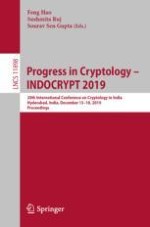
2019 | OriginalPaper | Buchkapitel
PKP-Based Signature Scheme
verfasst von : Ward Beullens, Jean-Charles Faugère, Eliane Koussa, Gilles Macario-Rat, Jacques Patarin, Ludovic Perret
Erschienen in: Progress in Cryptology – INDOCRYPT 2019
Aktivieren Sie unsere intelligente Suche, um passende Fachinhalte oder Patente zu finden.
Wählen Sie Textabschnitte aus um mit Künstlicher Intelligenz passenden Patente zu finden. powered by
Markieren Sie Textabschnitte, um KI-gestützt weitere passende Inhalte zu finden. powered by